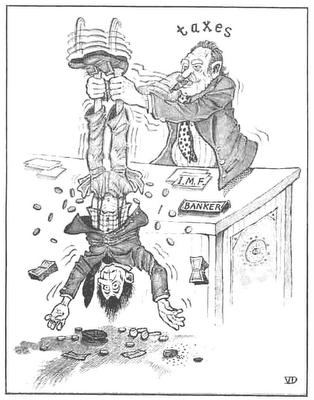
This was published in The Economic Times on September 29. As they say, one can never run away from taxes. US citizens deputed to other countries may now end up paying more tax.
Click here for the link on www.economictimes.com
Or else, read the text that has been pasted below:
Lubna Kably
Potpourri of tax stories
The introduction of fringe benefit tax, forced companies in India to pay taxes on fringe benefits provided to their employees. Keeping in view the demand-supply scenario of human capital, some of these companies through salary structuring passed on a portion of the fringe benefit tax to their employees. Others just had to grin and bear this levy.
Today, it is US companies that frequently depute their employees abroad that are facing a similar scenario. I happened to pick up the International Herald Tribune at an international airport lounge and this is what I learnt: The US Congress has raised taxes on Americans living abroad, forcing expats and US companies to rethink their compensation policies. Yes, we all know that US taxes its citizens on their global income, irrespective of whether they are deputed to a technology company in India or are teaching English in Japan. However, thanks to the foreign tax credit mechanism, a credit is available for foreign taxes against the taxes payable in the US.
Yet, a recently introduced legislation is set to make life more taxing. While US taxpayers will owe no tax on their first $82,400 of income earned abroad this year (against $80,000 in 2005), the new law caps the exclusion for housing allowances (rent), utilities (other than telephone), furniture rentals etc, which are common and significant salary components especially of senior personnel sent overseas. Under the earlier law there was no such cap and the sudden imposition of a cap certainly means bad news. Americans in no-tax or low-tax jurisdictions with high housing costs, like the Middle East, Singapore and Hong Kong, will be hit hardest, states this news report.
If one were to analyse, the foreign tax credit mechanism will not be effective enough, in these cases as the actual tax paid in the low tax foreign jurisdiction will be much lower than the US taxes.
International airport lounges are great for people watching. Except at times, you find to your surprise that other people have the same hobby. So, Sean who was watching me read this news item, walked up to me, glad he had found someone he could air his grievances to.
Sean who was being deputed to Bangalore may also face a greater tax brunt. He explained that on deputation one is forced to lead a more lavish lifestyle than back home. Entertaining people, which is a major role the expats, have to play, means having a lavish house, a huge allowance, including a substantial furniture allowance. For US tax exclusion purposes this allowance is now capped.
It is easier to speak about tax credits for taxes paid in the foreign country (such as India) than in actually obtaining one. Litigation does crop up. He however, hopes that his company will pick up this additional tax burden. Yet, like you or me, Sean is angry about tax evaders. The new mechanism does not have arms long enough to reach those Americans who are living abroad and are not filing their tax returns. “Believe me, if an American is not working for a US company but a foreign company, through omission or deliberate tactics, he or she tends to forget the US tax filing obligations,” he explains. Sean was in India to set up back office business operations. I wonder whether the extra burden on US expats will have a ripple effect on the Indian economy.
If an expat is being deputed to an Indian subsidiary, will the subsidiary have to indirectly bear the burden of this additional tax levy?
At the same time, there is some good news. Sean was glad to note that India is now emerging as a friendly place in which to do business. The Doing Business 2007 report released by the World Bank and the International Financial Corporation ranks 175 countries on the ease of doing business by considering factors affecting how easy it is to run and start business operations in such countries. Singapore has emerged as the easiest place in the world in which to operate a business, followed by New Zealand, US, Hong Kong (China) and the UK. India has emerged as the top reformer in South Asia. India cut the time to start a business from 71 to 25 days and reduced the corporate tax rate to 33.66%. A Supreme Court decision made enforcing collateral much simpler. Import time stood reduced through new custom procedures and reforms were introduced to strengthen investor protection. Pakistan emerges as the runner up. Yet, India still ranks relatively low at 134 and is 41 places behind China.
And as we boarded the flight, Sean leaned back in his seat, thankful that at least his business operations in India will kick off in 25 days. I certainly hope so.
(The author is a CA. Views are personal.)




No comments:
Post a Comment